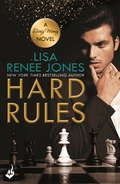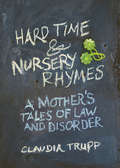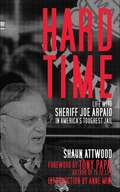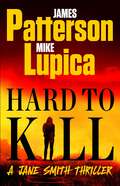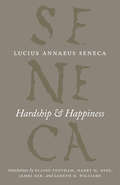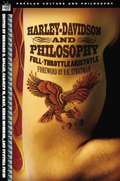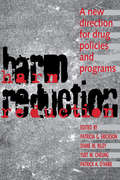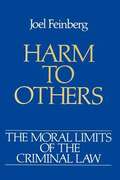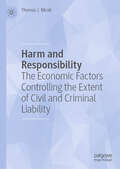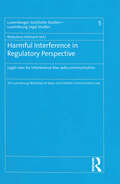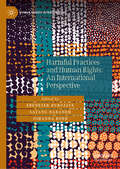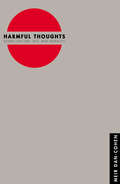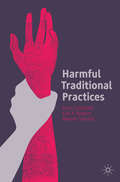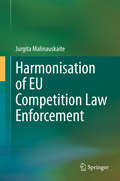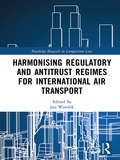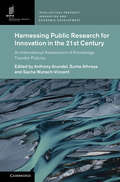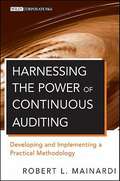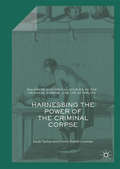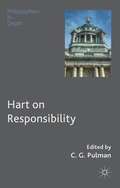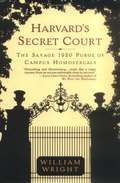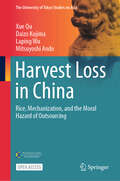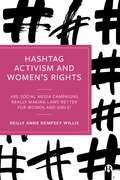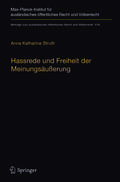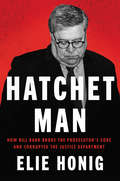- Table View
- List View
Hard Rules: Dirty Money 1 (Dirty Money)
by Lisa Renee JonesWall Street meets Sons of Anarchy in Hard Rules, the smouldering, scorching first novel in the explosively sexy Dirty Money series from New York Times bestseller Lisa Renee Jones, author of the Inside Out series, which Kirkus Reviews calls: 'Angst-y, sexy contemporary romance with big emotional and financial stakes set against the backdrop of two dynamic families. Sure to leave readers desperate for the next installment'.How bad do you want it? The only member of the Brandon empire with a moral compass, Shane Brandon is ready to make his family's business legitimate. His ruthless brother Derek wants to keep Brandon Enterprises cemented in lies, deceit and corruption. But the harder Shane fights to pull the company back into the light, the darker he has to become. Then he meets Emily Stevens, a woman who not only stirs a voracious sexual need in him, but becomes the only thing anchoring him between good and evil. Emily is consumed by an all-encompassing passion for Shane. She trusts him. He trusts her, but therein lies the danger. Because Emily has a secret - the very thing that brought her to him in the first place - and that secret could destroy them both.Are you ready to play by the hard rules of the Brandon family empire? Look for the next enthralling novel in the Dirty Money series, Damage Control.
Hard Time & Nursery Rhymes: A Mother's Tales of Law and Disorder
by Claudia TruppWhat kind of woman leaves three young daughters at home every morning to spend her days representing convicted murderers and rapists? That is the question criminal defense attorney Claudia Trupp confronts in this sharp and riveting memoir as she seeks answers—for herself and, mostly, for her daughters.Every working mother faces the challenges of balancing work and home, but the nature of Trupp's work makes her juggling act all the more precarious—and at times hilarious and bizarre. Trupp's domestic anecdotes of life with her kids run parallel to narratives of her most memorable, and often unsettling, criminal cases, each providing a platform to explore broader issues such as faith, perspective, and charm. The navigation of radically different realms—the criminal courts and maximum security prisons where clients serve hard time, and the home front where children demand marshmallows for breakfast—provides thought-provoking and entertaining reading.While the working mother has been a popular subject of fiction and self-help guides, this may be the only book offering a woman's deeply personal and unapologetic account of how embracing a challenging job while simultaneously guiding a family reaps unexpected benefits on both fronts. In a memoir that will resonate powerfully with all women, Trupp candidly conveys to the reader and to her daughters the struggles and rewards of the conflicting roles in her life, the joy she has found in being a mother, and the value of meaningful work.
Hard Time: Life with Sheriff Joe Arpaio in America?s Toughest Jail (English Shaun Trilogy Ser. #Vol. 2)
by Anne Mini Tony Papa Shaun AttwoodShaun Attwood was a millionaire day trader in Phoenix, Arizona, but his hedonistic lifestyle of drugs and parties came to an abrupt end in 2002 when a SWAT team broke down his door. Attwood found himself on remand in Maricopa Jail with a $750,000 cash bond and all of his assets seized. The nightmare was only just beginning as he was submerged in a jail in which rival gangs vied for control, crystal meth was freely available, and where breaking rules could result in beatings or death. Sheriff Joe Arpaio’s jails have the highest death rate in the United States. Hard Time is the harrowing yet darkly humorous account of the time Attwood spent submerged in a nightmarish world of gang violence and insect-infested cells, eating food unfit for animals. His remarkable story provides a revealing glimpse into the tragedy, brutality, comedy, and eccentricity of prison life.
Hard to Kill: A Jane Smith Thriller (A Jane Smith Thriller #2)
by James Patterson Mike LupicaInstant New York Times Bestseller! &“With Jane Smith, Alex Cross has reason to be jealous&” (Good Morning America). Hard to Kill features James Patterson&’s greatest character yet–a tough-as-nails attorney up against a relentless killer. Attorney Jane Smith is mounting an impossible criminal defense. Her client, Rob Jacobson, is the unluckiest of the unlucky. No sooner is he accused of killing a family of three in the Hamptons than a second family is gunned down. It&’s not double jeopardy. It&’s not double murder. It&’s double triple homicide. Jane&’s career has spanned from NYPD beat cop to Hamptons courtroom. She&’s tough to beat. She&’s even tougher to kill. The defense may never rest.
Hardship and Happiness
by Lucius Annaeus SenecaLucius Annaeus Seneca (4 BCE-65 CE) was a Roman Stoic philosopher, dramatist, statesman, and advisor to the emperor Nero, all during the Silver Age of Latin literature. The Complete Works of Lucius Annaeus Seneca is a fresh and compelling series of new English-language translations of his works in eight accessible volumes. Edited by Elizabeth Asmis, Shadi Bartsch, and Martha C. Nussbaum, this engaging collection helps restore Seneca--whose works have been highly praised by modern authors from Desiderius Erasmus to Ralph Waldo Emerson--to his rightful place among the classical writers most widely studied in the humanities. Hardship and Happiness collects a range of essays intended to instruct, from consolations--works that offer comfort to someone who has suffered a personal loss--to pieces on how to achieve happiness or tranquility in the face of a difficult world. Expertly translated, the essays will be read and used by undergraduate philosophy students and experienced scholars alike.
Harley-Davidson and Philosophy
by Cynthia Pineo Kerri Mommer Carolyn M. Gray Bernard E. Rollin R. K. StratmanIt's no wonder descriptions of riding often resemble the words of Asian mystics and Jedi knights: The ride causes your senses to open completely. You experience only the present, the now. Readers who prefer revving a Harley to meditating in a Zen garden know that biking is just as contemplative as chanting in the lotus position. Here, philosopher-bikers explore this seeming dichotomy, expounding on intriguing questions such as: Why are the motorcycles the real stars of Easy Rider? What would Marx and Foucault say about Harley riders' tight leather garb? What's it like to live a dual life as a philosophy professor who wrenches his own 1965 Electra Glide? Would Jesus hang out in a biker bar or a coffeehouse? And more importantly, would He ride a Harley or a Honda? These witty, provocative essays give readers and riders a new appreciation of what it means to become one with the road.
Harm Reduction
by Patricia G. Erickson Diane M. Riley Yuet W. Cheung Pat A. O'HareSince the First International Conference on the Reduction of Drug-Related Harm, held in 1990, the term 'harm reduction' has gained wide currency in the areas of public health and drug policy. Previously the field was characterized by heated struggle between prohibition and legalization of addictive substances, and this debate tended to obscure practical, collective approaches. Harm reduction, an approach which encompasses various policy directives and program initiatives was inspired by the positive outcomes of such public measures as needle-exchange programs for reduction of HIV risk, methadone maintenance programs, education on the risks of tobacco use, and programs designed to limit alcohol consumption.The essays in this book illustrate the scope and vigour of the emerging harm reduction model. The essays, drawn from seven international conferences on harm reduction, cover a wide variety of topics, including public policy, women and reproductive issues, the experiences of special populations, human rights; defining and measuring harm, and intervention.Researchers and practitioners will benefit from the varied papers in the volume, which combine insights into policy-making and front-line outreach efforts with comprehensive conceptual and empirical approaches. Harm Reduction represents an important initiative in making academic work accessible and useful to a larger community, and provides guidance for the development of effective policies and programs.
Harm To Others: The Moral Limits of the Criminal Law, Volume 1
by Joel FeinbergThis first volume in the four-volume series The Moral Limits of the Criminal Law focuses on the "harm principle," the commonsense view that prevention of harm to persons other than the perpetrator is a legitimate purpose of criminal legislation. Feinberg presents a detailed analysis of the concept and definition of harm and applies it to a host of practical and theoretical issues, showing how the harm principle must be interpreted if it is to be a plausible guide to the lawmaker.
Harm and Responsibility: The Economic Factors Controlling the Extent of Civil and Criminal Liability
by Thomas J. MiceliRisk is an ever-present feature of life in a complex world, and it is important for societies to manage it in a just and efficient manner. One way to reduce risk is to assign responsibility for the associated harm. In this book, economist Thomas J. Miceli examines harm and responsibility from an economic perspective. The book focuses on how responsibility affects people’s incentives to refrain from causing unnecessary harm to achieve what economists call optimal deterrence. Secondarily, it is concerned with the quest for justice. Defining this is part of the journey. Does it mean compensating victims for unavoidable losses? Does it involve punishing wrongdoers in proportion to the harm they have caused? Is there a clear answer? The book addresses these questions and more, explaining how, in some cases, these objectives will align with deterrence and in others they will not. The book discusses the ways that the law, tempered by religious and social norms, strikes a balance between these goals. The principal areas of law that assign legal responsibility are tort law (for accidental harms) and criminal law (for intentional harms). There exist vibrant economic theories of both, and this volume draws on this literature. One theme that emerges is the role of causation in determining responsibility. Attributing responsibility for a given harm to the party that caused it seems both morally just (because it embodies personal responsibility), and economically desirable (because it achieves deterrence in the most direct manner). And yet the law departs from this prescription in any number of ways, both by limiting the responsibility of some who caused harm and by expanding responsibility to some who did not. The book offers readers coherent economic explanations for these departures from a purely causal basis for legal responsibility. Author Thomas J. Miceli clarifies causation as reciprocal in nature and therefore not a uniquely defined concept. This means that when an action by A causes harm to B, the question is not how to restrain A but rather: whether A has the legal right to take the action in question or whether B has the right to prevent it. There will be a harm either way; the relevant question is which party should bear it. This insight ultimately leads to the fundamental problem of defining harm. In most conflicts this can be straightforward—as when A punches B—but in others it is more challenging. For example, when does free speech become hate speech? Where is the line drawn? The book concludes by drawing out the implications of this fundamental ambiguity over the meaning of harm, what that means for the law, and what economic theory has to say about it.
Harmful Interference in Regulatory Perspective: Legal rules for interference-free radio communication
by Mahulena HofmannThis collection analyses the regulatory aspects of harmful interference faced by those entities operating space communication and broadcasting. While technology reacts to this international phenomenon with the development of continuously improving technological systems for preventing and combating harmful interference, its international regulatory and legal framework develops at a much slower pace. Issues discussed include the increasing deterioration of signals from broadcasting and communication satellites, including cases of intentional interference known as `jamming’; the human rights balance between freedom of expression and protection from hate speech; the efficacy of the current regulatory system and the legal consequences of non-compliance; the role of national authorities, and supranational bodies such as the EU and UN. The contributors include experts drawn from international and national academia, the ITU, national regulatory authorities and operators to present an international, multidimensional, and critical analysis of this complex phenomenon.
Harmful Practices and Human Rights: An International Perspective (Human Rights Interventions)
by Ebenezer Durojaye Johanna Bond Satang NabanehHarmful Practices and Human Rights examines different forms of harmful practices, globally, which constitute human rights violations as guaranteed in international and regional human rights instruments. Drawing examples from Africa, Asia, North America, Europe, and Australasia, it demonstrates how these practices undermine the right to health, including sexual and reproductive health, and also impugn the dignity and autonomy of women and girls. Using diverse harmful practices as case studies, the book critically examines the factors that drive harmful practices in developing and developed countries. Specifically, this book focuses on a selection of harmful practices—including dowry payments, ukuthwala, intimate partner violence, harmful tobacco use and its gendered implications, trafficking in persons, widowhood practices, the chinamwari/khomba practice, and child marriage—from both the Global South and North. Its intent is to demonstrate the prevalence of these abuses and underscore the urgent need for states to take decisive steps toward eradication.
Harmful Thoughts: Essays on Law, Self, and Morality
by Meir Dan-CohenIn these writings by one of our most creative legal philosophers, Meir Dan-Cohen explores the nature of the self and its response to legal commands and mounts a challenge to some prevailing tenets of legal theory and the neighboring moral, political, and economic thought. The result is an insider's critique of liberalism that extends contemporary liberalism's Kantian strand, combining it with postmodernist ideas about the contingent and socially constructed self to build a thoroughly original perspective on some of the most vital concerns of legal and moral theory. Dan-Cohen looks first at the ubiquity of legal coercion and considers its decisive impact on the nature of legal discourse and communication, on law's normative aspirations and claim to obedience, and on the ideal of the rule of law. He moves on to discuss basic values, stressing the preeminence of individual identity and human dignity over the more traditional liberal preoccupations with preference-based choice and experiential harm. Dan-Cohen then focuses more directly on the normative ramifications of the socially constructed self. Fundamental concepts such as responsibility and ownership are reinterpreted to take account of the constitutive role that social practices--particularly law and morality--play in the formation of the self. Throughout, Dan-Cohen draws on a uniquely productive mix of philosophical traditions and subjects, blending the methods of analytic philosophy with the concerns of Continental philosophers to reconceive the self and its relation to ethics and the law.
Harmful Traditional Practices: Prevention, Protection, and Policing
by Gerry Campbell Karl A. Roberts Neelam SarkariaThis book is about harmful traditional practices: damaging and often violent acts which include female genital mutilation, forced marriage, honour killings and abuse, breast ironing, witchcraft and faith-based abuse. Often targeting women and young girls, these practices are often justified on spurious religious or traditional grounds but are all forms of abuse. Roberts, Campbell and Sarkaria have backgrounds in psychology, policing and law and have spent many years working at the forefront of attempts to end these practices. Harmful Traditional Practices is therefore a uniquely pragmatic book which aims to inform readers about these acts while identifying the best approaches towards ending and prosecuting against them.
Harmonisation of EU Competition Law Enforcement
by Jurgita MalinauskaiteThis book explores how the EU’s enforcement of competition law has moved from centralisation to decentralisation over the years, with the National Competition Authorities embracing more enforcement powers. At the same time, harmonisation has been employed as a solution to ensure that the enforcement of EU competition rules is not weakened and the internal market remains a level playing field.While employing a comparative law argument, the book, accordingly, analyses the need for harmonisation throughout the different stages of development of the EU’s competition law enforcement (save Merger control and State Aid), the underlying rationale, and the extent to which comparative studies have been undertaken to facilitate the harmonisation process from an historical perspective. It also covers the Directives, such as the Antitrust Damages Directive and the ECN+ Directive. Investigating both public and private enforcement, it also examines the travaux préparatoires for the enforcement legislation in order to discover the drafters’ intent. The book addresses the European and the Member States’ perspectives, namely, the Central and Eastern European (CEE) countries, as harmonisation proceeds through dialogue and cooperation between the two levels. Lastly, it explores the extent to which harmonisation of the competition law enforcement framework has been accepted and implemented in the Member States’ legal systems, or has led to the fragmentation of the national systems of the CEE countries.
Harmonising Regulatory and Antitrust Regimes for International Air Transport (Routledge Research in Competition Law)
by Jan WalulikHarmonising Regulatory and Antitrust Regimes for International Air Transport addresses the timely and problematic issue of lack of uniformity in legal standards for international civil aviation. The book focuses on discrepancies within the regulatory and antitrust framework, comprehensively reveals the major legal limitations and conflicts, and presents possible solutions thereto. It discusses possible strategies for multilateralisation and defragmentation of air law, and for international harmonisation of airline economic regulation with fair competition standards. This discussion extends to competition between air transport law and other legal regimes as well as to specific regulatory problems related to air transport. The unique feature of the book is that it reconciles distinct perspectives on these issues presented by renowned aviation and aerospace experts who represent the world’s key air transport markets and air law academic centres. By providing unbiased solutions that could serve as a base for future international arrangements, this book will be invaluable for aviation professionals, as well as students and scholars with an interest in air law, economic regulation, antitrust studies, international relations, transportation policy and airline management.
Harnessing Foreign Investment to Promote Environmental Protection
by Jorge E. Viñuales Pierre-Marie DupuyHarnessing Foreign Investment to Promote Environmental Protection investigates the main challenges facing the implementation of environmental protection and the synergies between foreign investment and environmental protection. Adopting legal, economic and political perspectives, the contributing authors analyse the various incentives which encourage foreign investment into pro-environment projects (such as funds, project-finance, market mechanisms, payments-for-ecosystem services and insurance) and the safeguards against its potentially harmful effects (investment regulation, CSR and accountability mechanisms, contracts and codes of conduct).
Harnessing Public Research for Innovation in the 21st Century: An International Assessment of Knowledge Transfer Policies (Intellectual Property, Innovation and Economic Development)
by Sacha Wunsch-Vincent Anthony Arundel Suma AthreyeUniversities and public research institutes play a key role in enabling the application of scientific breakthroughs and innovations in the marketplace. Many countries – developed and developing alike – have implemented national strategies to support the application or commercialization of knowledge produced by public research organizations. Universities and public research institutes have introduced practices to support these activities, for instance by including knowledge transfer to promote innovation as a core part of their mission. As a result, a vital question for policymakers is how to improve the efficiency of these knowledge transfer practices to help maximize innovation-driven growth and/or to seek practical solutions to critical societal challenges. This book aims to develop a conceptual framework to evaluate knowledge transfer practices and outcomes; to improve knowledge transfer metrics, surveys and evaluation frameworks; and to generate findings on what works and what does not, and to propose related policy lessons. This book is also available as Open Access.
Harnessing the Power of Continuous Auditing
by Robert L. MainardiWritten to help auditors jump start their organization's near real-time financial data monitoring and sharing capabilities, Harnessing the Power of Continuous Auditing provides step-by-step instruction on how to build, market, implement, and manage a successful continuous auditing program.Taking concept to reality, author and internal audit expert Robert L. Mainardi presents auditors, company executives, business unit managers, practitioners, and consultants with a complete road map to continuous auditing, from start to finish. Beginning with a thorough definition of the subject, Mainardi debunks the various myths surrounding the process?including the most common misperception that the internal audit department must have the corresponding automated technology to support it?and includes numerous documented proven techniques and instructions for more effective SOX work.A vital tool to enhance the auditor's skills and abilities, Harnessing the Power of Continuous Auditing's exhaustive coverage includes: The definition of continuous auditing Where to begin Methodology development Preparing for continuous auditing Root cause analysis Action plans Problem-solving tools Lessons learned Selling continuous auditing Conditions and challenges This all-in-one handbook of practical execution provides much-needed, accessible guidance on everything business professionals need to know to conduct and implement a successful continuous audit in their organizations.
Harnessing the Power of the Criminal Corpse (Palgrave Historical Studies In The Criminal Corpse And Its Afterlife Ser.)
by Sarah Tarlow Emma Battell LowmanThis open access book is the culmination of many years of research on what happened to the bodies of executed criminals in the past. Focusing on the eighteenth and nineteenth centuries, it looks at the consequences of the 1752 Murder Act. These criminal bodies had a crucial role in the history of medicine, and the history of crime, and great symbolic resonance in literature and popular culture. Starting with a consideration of the criminal corpse in the medieval and early modern periods, chapters go on to review the histories of criminal justice, of medical history and of gibbeting under the Murder Act, and ends with some discussion of the afterlives of the corpse, in literature, folklore and in contemporary medical ethics. Using sophisticated insights from cultural history, archaeology, literature, philosophy and ethics as well as medical and crime history, this book is a uniquely interdisciplinary take on a fascinating historical phenomenon.
Hart On Responsibility
by Christopher PulmanA collection of essays discussing Herbert Hart's writings on responsibility. The essays focus upon Hart's work on causation in the law and on the justification of punishment. Specific topics discussed include senses of 'responsibility', voluntariness, Mill's harm principle, mens rea, excuses, the Hart-Wootton debate, and negligence.
Harvard's Secret Court: The Savage 1920 Purge of Campus Homosexuals
by William WrightIn 2002 a researcher with the Harvard Crimson came across a stack of files labeled, "Secret Court Files, 1920." The accidental discovery led to the unveiling of an episode in the university's history which had been hidden away for more than eighty years. In the spring of 1920, Harvard officials were notified of a group of active homosexuals on campus. Students were called in for questioning one at a time, and many were immediately expelled. Furthermore, the school used its power to shatter the futures of these young men, making it impossible for them to be admitted to other schools or to enter the professions of their choosing. Based on the original documents and interviews with surviving family members, this book is a poignant account of the 1920 purge and a reflection upon the fear and prejudice which brought it about.
Harvest Loss in China: Rice, Mechanization, and the Moral Hazard of Outsourcing (The University of Tokyo Studies on Asia)
by Xue Qu Daizo Kojima Laping Wu Mitsuyoshi AndoThis open access book examines food security in China with a specific focus on rice harvesting. As the most populous agricultural developing country, China’s food security is closely related to the world’s food security. An urgent issue internationally, data show that every year, about one-third of food is lost and wasted before it even reaches the market, mainly in less developed countries. To this end, halving the amount of food loss and waste is one of the Sustainable Development Goals. In 2021, the Chinese government issued the Anti-Food Waste Law of the People’s Republic of China, placing a high priority on food loss reduction. Rice, one of the major staple foods, has also received a higher priority in government policy, as it has been deemed required to be “absolutely safe”. In China, rice farmers rely heavily on outsourcing services to complete harvesting, which has led to the rapid development of mechanical harvesting. This book shows that the essence of outsourcing services is a principal–agent relationship in which there is a potential moral hazard, which is considered detrimental to harvest losses. The book analyses the effect of the moral hazard in harvest outsourcing services on rice harvest losses from this principal–agent theoretical perspective. Using the latest nationwide farmer survey, it empirically demonstrates the moral hazard in agricultural outsourcing services and its negative impact on harvest losses, providing suggestions for food loss reduction in China and similar developing countries where agricultural outsourcing services are developing rapidly. Relevant to social science researchers working in areas of food security in connection with the SDGs, and to scholars studying development in China more generally, this is a timely contribution confronting possible means of food loss reduction, in the developing world particularly, in the East, and globally.
Hashtag Activism and Women’s Rights: Are Social Media Campaigns Really Making Laws Better for Women and Girls?
by Reilly Anne Dempsey WillisWith over five billion internet users globally, it is crucial to understand social media activism and legal change for women and girls. This insightful book examines the impact of international Twitter (now X) campaigns on domestic laws affecting women and girls. Exploring the complexities of legal change for women and girls across seven countries from Latin America to Middle East and Africa, the book offers empirical insights into the effectiveness of hashtag advocacy and sheds light on the role of social media in shaping different outcomes. This is a key resource for understanding the dynamics driving social media activism and its potential impact on the rights of women and girls worldwide.
Hassrede und Freiheit der Meinungsäußerung: Der Schutzbereich der Meinungsäußerungsfreiheit in Fällen demokratiefeindlicher Äußerungen nach der Europäischen Menschenrechtskonvention, dem Grundgesetz und der Charta der Grundrechte der Europäischen Union (Beiträge zum ausländischen öffentlichen Recht und Völkerrecht #278)
by Anna Katharina StruthDieses Buch analysiert den grundrechtlichen Schutzbereich der Garantien der Meinungsäußerungsfreiheit in den Grundrechtskatalogen der EMRK, des Grundgesetzes und der Grundrechtecharta der EU. Das Werk untersucht, inwieweit Hassreden und vergleichbare demokratiefeindliche Äußerungen vom Schutzbereich der Meinungsäußerungsfreiheit umfasst sind. Die Autorin setzt sich mit der zu diesen Äußerungen ergangenen Rechtsprechung der zuständigen Gerichte auseinander. Sie kommt über ausführliche Auslegungserwägungen zu den relevanten Bestimmungen zum Ergebnis, dass die Äußerungen, auch wenn sie einen Grundrechtsmissbrauch darstellen, im Schutzbereich der Meinungsäußerungsfreiheit liegen und ihr Verbot einen rechtfertigungsbedürftigen Eingriff in das Grundrecht darstellt. Diese Schlussfolgerung wird mit der Feststellung verbunden, dass die Anforderungen an die Rechtfertigung eines solchen Eingriffs wegen der in diesen Fällen typischerweise vorliegenden Interessenlage regelmäßig erfüllt werden können.
Hatchet Man: How Bill Barr Broke the Prosecutor's Code and Corrupted the Justice Department
by Elie HonigCNN Senior Legal Analyst Elie Honig exposes William Barr as the most corrupt attorney general in modern U.S. history, with stunning new scandals bubbling to the surface even after Barr's departure from office. In Hatchet Man, former federal prosecutor Elie Honig uncovers Barr’s unprecedented abuse of power as Attorney General and the lasting structural damage done to the Justice Department. Honig uses his own experience as a prosecutor at DOJ to show how, as America’s top law enforcement official, Barr repeatedly violated the Department’s written rules, and those vital, unwritten norms and principles that comprise the “prosecutor’s code.”Barr was corrupt from the beginning. His first act as AG was to distort the findings of Special Counsel Robert Mueller, earning a public rebuke for his dishonesty from Mueller himself and, later, from a federal judge. Then, Barr tried to manipulate the law to squash a whistleblower’s complaint about Trump’s dealings with Ukraine—the report that eventually led to Trump’s first impeachment. Barr later intervened in an unprecedented manner to undermine his own DOJ prosecutors on the cases of Michael Flynn and Roger Stone, both political allies of the President. And then Barr fired the U.S. Attorney for the Southern District of New York under false pretenses. Finally, Barr amplified baseless theories about massive mail-in ballot fraud, pouring gasoline on the dumpster fire battle over the 2020 election results and contributing to the January 6 insurrection that led to Trump’s second impeachment.In Hatchet Man, Honig proves that Barr trampled the two core virtues that have long defined the department and its mission: credibility and independence – ultimately in service of his own deeply-rooted, extremist legal and personal beliefs. Honig shows how Barr corrupted the Justice Department and explains what we must do to prevent this from ever happening again.
